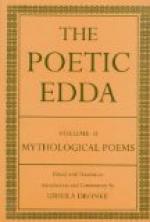There are two main elements in the Volsung story: the slaying of the dragon, and the awakening and desertion of Brynhild. The latter is brought into close connexion with the former, which becomes the real centre of the action. In the Anglo-Saxon reference, the fragment in Beowulf, the second episode does not appear.
In this, the oldest version of the story, which, except for a vague reference to early feats by Sigmund and Sinfjoetli, consists solely of the dragon adventure, the hero is not Sigurd, but Sigemund the Waelsing. All that it tells is that Sigemund, Fitela (Sinfjoetli) not being with him, killed the dragon, the guardian of the hoard, and loaded a ship with the treasure. The few preceding lines only mention the war which Sigmund and Sinfjoetli waged on their foes. They are there uncle and nephew, and there is no suggestion of the closer relationship assigned to them by Voelsunga Saga, which tells their story in full.
Sigmund, one of the ten sons of Volsung (who is himself of miraculous birth) and the Wishmaiden Hlod, is one of the chosen heroes of Odin. His twin-sister Signy is married against her will to Siggeir, an hereditary enemy, and at the wedding-feast Odin enters and thrusts a sword up to the hilt into the tree growing in the middle of the hall. All try to draw it, but only the chosen Sigmund succeeds. Siggeir, on returning to his own home with his unwilling bride, invites her father and brothers to a feast. Though suspecting treachery, they come, and are killed one after another, except Sigmund who is secretly saved by his sister and hidden in the wood. She meditates revenge, and as her two sons grow up to the age of ten, she




